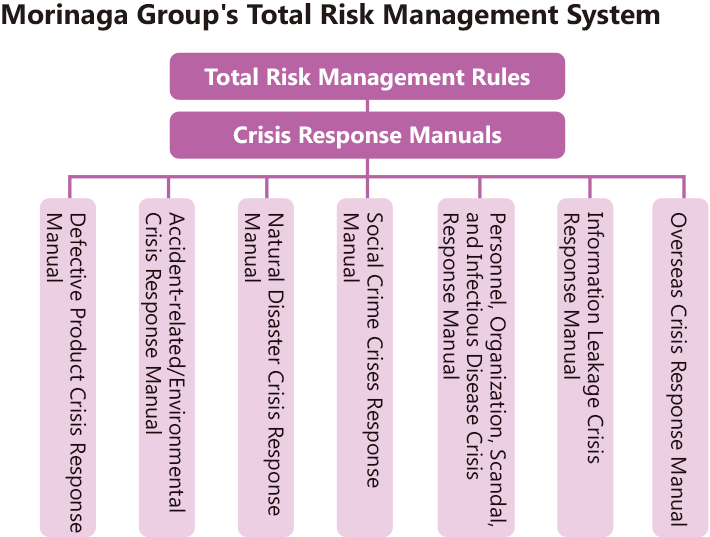The Morinaga Group identifies total risk that potentially exists in its business activities and takes appropriate measures against the risk based on the philosophy of total risk management.
(1) To Fulfill Corporate Social Responsibility
(i) Ensuring of the safety of employees and visitors
(ii) Safeguarding of assets
(iii) Early business recovery and ensuring of business continuity
(2) To Gain Corporate Social Responsibility
(i) Timely and appropriate information disclosure
(ii) Contribution to local communities
(iii) Humanitarian considerations
In an effort to respond to potential risks existing in its business activities, the Morinaga Group established the “Total Risk Management Rules” in FY2002/3 as part of its internal control system. Based on the Rules, we classify and assess possible risks and implement preventive measures in normal times. See the table below for major possible risks and countermeasures.
The Total Risk Management Rules includes various manuals such as the Natural Disaster Crisis Preparedness Manual, which sets out measures to ensure an early resumption of business in case of crisis. In FY2018/3, in an attempt to take our business continuity plan (BCP) a step further, we began to work on the development of business continuity management (BCM), a framework of continuous improvements that allow the Company to continue operations even when being affected by a disaster or accident, or resume operations as early as possible after an interruption.
In the event of a crisis, we will assess and judge the situation promptly, take necessary actions such as the establishment of a task force and information disclosure, while conducting a cause analysis and implementing recurrence prevention measures.
Further, to demonstrate our strong stance against anti-social forces, we appointed a person in charge of preventing unreasonable demands. We also work to collect information from related administrative agencies, and, in case of an emergency, we will take organization-wide actions swiftly, working closely with these agencies.

Main Risks and Responses in Our Group
■ Important risks that might affect business performance or financial position from a short- to medium-term perspective
| Risk Items | Assumed risks | Degree of impact |
Frequency of occurrence |
Responses by the Morinaga Group |
|---|---|---|---|---|
| Cyber-attacks |
|
High | Medium |
|
| Product defects and recalls |
|
High | Medium |
|
| Occupational accidents |
|
High | Medium |
|
| Investment in property,plant, and equipment |
|
High | Medium |
|
| Leakage of personal information due to unauthorized removal |
|
High | Medium |
|
| Supply chain disruptions caused by typhoons,storm surges,water damage,and/or floods |
|
Medium | Medium |
|
| Spread of infectious diseases |
|
Medium | Medium |
|
■ Important risks that might affect business performance or financial position from a medium- to long-term perspective
| Risk Items | Assumed risks | Degree of impact |
Frequency of occurrence |
Responses by the Morinaga Group |
|---|---|---|---|---|
| Procurement of raw materials and supplies |
|
High | High |
|
| Increased costs for compliance with greenhouse gas emission regulations |
|
Medium | High |
|
| Increased costs of compliance with energy-saving policies |
|
High | Medium | |
| Stagnation of succession planning |
|
High | Medium |
|
The above factors are not the only factors that may have an impact on business results and financial position.